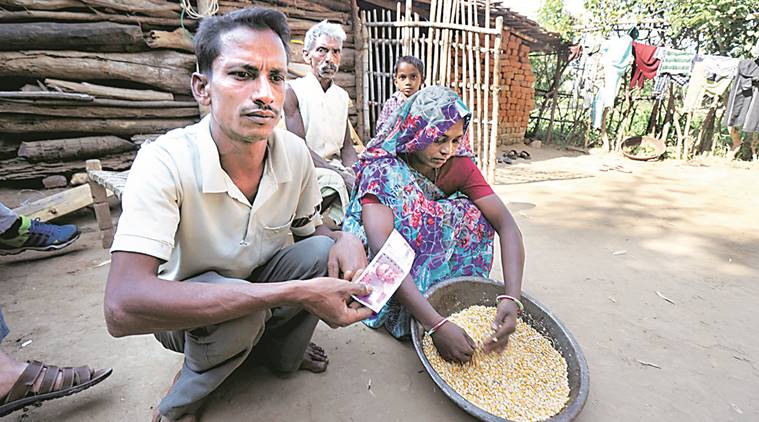- India
- International
Gujarat villages after demonetisation: No change for Rs 2,000 notes, barter system back
Chhagan Hathila and many others from the village, populated mostly by farmers with small holdings, have been forced to go back to the barter system following the Centre’s demonetisation move.
 Chhagan Hathila with his family outside his house. (Source: Express photo by Bhupendra Rana)
Chhagan Hathila with his family outside his house. (Source: Express photo by Bhupendra Rana)
In Aamli Menpur village of Dhanpur taluka of Gujarat’s Dahod district, Chhagan Hathila (46), a farmer, is getting ready to visit a grocery shop in the nearby village. His wife is cleaning the maize that grew on his farm. He would exchange it for a few days of grocery supplies. Chhagan and many others from the village, populated mostly by farmers with small holdings, have been forced to go back to the barter system following the Centre’s demonetisation move. Dhanpur taluka is yet to see it’s first ATM. While the people here have managed to get rid of demonetised notes at banks, they now have 2000 rupee notes which no one is ready to give change for. Hence, Chhagan and others have started exchanging maize for vegetables and spices. With more and more farmers exchanging maize for grocery supplies, the price of maize has come down from Rs 250 to Rs 200 for 20 kg.
Hathila had two 1000 rupee notes, in return of which he got a new Rs 2000 from the bank. “I have been trying to buy vegetables and groceries, but everyone is refusing this note. Some shopkeepers are asking me to deposit the whole amount. So I have told a shopkeeper that we will barter maize for vegetables and grocery items,” said Hathila.
The grocers, on their part, are selling the maize to retailers or wholesellers in Dahod town for a profit of Rs 3 or 4 per kg.
Sanchi ben Bariya (67) came to Dhanpur post office from Vakasiya village to exchange old notes. Showing the 2000 rupee note, she said, “Now how do I buy daily goods?… I ran out of detergent a week ago, but I cannot buy it despite having money.”
Dhanpur taluka post office, which has been receiving nearly Rs 5 lakh in cash daily since the demonetisation move, is disbursing only 2000 rupee notes. Sub Postmaster R R Bariya said: “We are receiving only Rs 2000 notes from the head office. We are helpless.”
Paddy farmers have crop ready to be cut and processed, but no change to pay labourers. Narmada Bhuriya withdrew
Rs 24, 000 and received only 2000 rupee notes. She has not been able to pay the labourers. “I have all this money, but no change,” she said.

Dhanpur taluka has three banks which cater to around 60 villages. Manager of SBI’s Dhanpur branch Amit Singh said: “We mostly receive Rs 2000 notes as smaller denominations go to ATMs.”
Bank Mitras, too, are facing problems. Ramesh Rathwa, a Bank Mitra who also owns a grocery shop near Kanjetha village, said: “The bank gives me Rs 1 lakh a day, all of it in Rs 2000 note… Shopkeepers cannot keep accepting grains as they won’t be able to sell it further.” Mukesh Chauhan, who owns a grocery shop in Rachhva village, asked: “Everyone is coming with 2000 rupee notes. How can I give change to everyone?”
Apr 24: Latest News
- 01
- 02
- 03
- 04
- 05







































